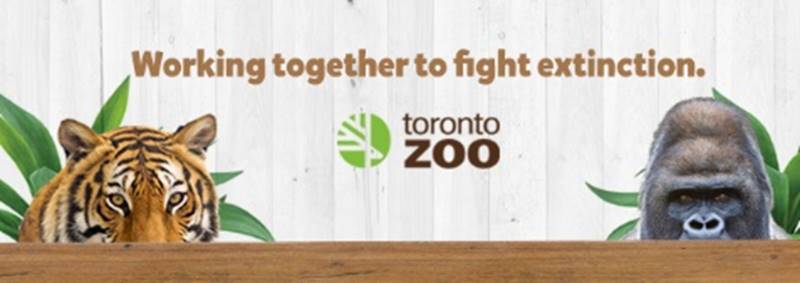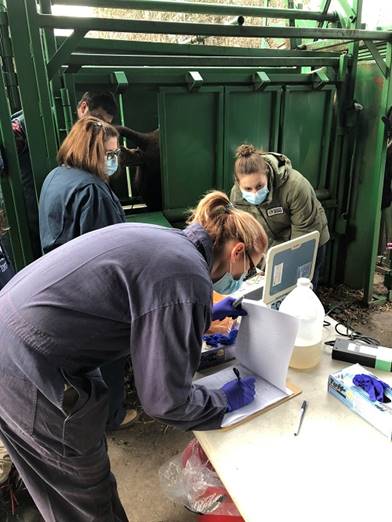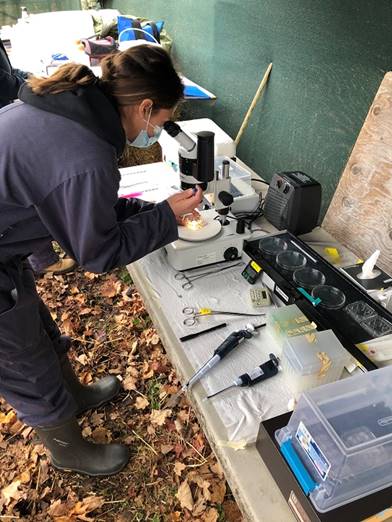
YOUR TORONTO ZOO’S SCIENTISTS WORK TO OPTIMIZE
EMBRYO TRANSFER TECHNIQUES TO FIGHT EXTINCTION


Left: Your Toronto Zoo’s Reproductive Sciences Team In The Field, led by Dr. Gabriela Mastromonaco, Manager of Reproductive Sciences
Right: Miranda Zwiefelhofer, University of Saskatchewan, Photo Credit: Toronto Zoo
TORONTO, ON, Monday, November 30, 2020: The global rate of extinction of animal and plant life is now estimated at nearly 1,000 times the natural rate. Your Toronto Zoo’s mission of connecting people, animals and conservation science to fight extinction has never been more important. It is critical that zoos, aquariums, and conservation organizations work together to educate the public and take actions to stabilize and reverse this alarming trend.
Toronto Zoo has been involved in wood bison conservation since 1977 and since that time, efforts from various organizations have resulted in the species being down listed from “endangered” to “threatened”. On-going disease concerns in remaining wood bison populations continue to threaten this species, such as tuberculosis and brucellosis. Reproductive technologies, such as artificial insemination and in vitro fertilization, are important tools for improving the genetic management of small populations. These techniques will help us overcome the challenges of managing the endemic disease that is threatening wood bison herds in the wild. Preservation and distribution of disease-free genetic material, in the form of sperm or embryos, will enable us to maintain genetically diverse disease-free herds in captivity and the wild.
Your Toronto Zoo’s Reproductive Sciences team has been working on optimizing embryo transfer techniques in wood bison along with our collaborators at the University of Saskatchewan. Production and transfer of embryos into wood bison is a complex process involving many stages and collaboration across our teams in Wildlife Care, Wildlife Health, and Reproductive Sciences. Wildlife Care staff work with our bison females on a regular basis, training them to voluntarily enter a chute, thus allowing Zoo staff to do regular health checkups, administer vaccines, and more in a reduced stress environment. In the particular case of embryo transfer, the animals need to be calm and willing to go into the chute on multiple occasions to complete the treatment program.
On October 8, 2020, the first day of the trials, 17 female bison voluntarily entered the chute and received the first of three hormone injections, allowing our Reproductive Sciences team to synchronize their reproductive cycle. The goal is to induce ovulation for the entire herd on a precise date which will not only create the optimal environment for an embryo to transfer, but will also allow us to transfer all females on the same day. The embryos were produced in Dr. Gregg Adam’s lab (University of Saskatchewan) by post-doctoral and graduate students, Eric and Miranda Zwiefelhofer, cryogenically frozen, and transported to Toronto Zoo. On October 27, 2020, 15 of the 17 females originally included in the trial received embryo transfers, starting the countdown to the pregnancy check on day 30 post-ovulation by ultrasound. The transfer of embryos into females does not guarantee a pregnancy. It is a complicated technique in any species, and has only recently been in development for wood bison.
On November 19, 2020, day 30 post-ovulation, teams from Wildlife Care, Wildlife Health, Reproductive Science and University of Saskatchewan performed ultrasounds on each female bison, but unfortunately no fetal heartbeats were detected. Embryo survival outside and inside the female’s body is highly sensitive to small changes in environment, including hormones, temperature, and more, which makes the development of embryo-based techniques a highly challenging process.
“While species protection within their natural habitat is a necessary measure, preservation of the fragile genetic and demographic health of small populations can be challenging in the wild, but can be successfully maintained, and even improved, through carefully managed conservation breeding programs as the wood bison,” said Dr. Gabriela Mastromonaco, Manager of Reproductive Sciences, Toronto Zoo. “Although this year’s embryo transfers were not successful, this is a success for the conservation breeding program as a whole, as your Toronto Zoo plays a critical role as the test site for this important research”
It is critical that zoos, aquariums, and conservation organizations work together to educate the public and take actions to stabilize and reverse the alarming decline of species, not only globally but in our own backyard. As the largest zoo in Canada, your Toronto Zoo is well known for being a world leader in reproductive sciences and for our extensive expertise in conservation breeding and reintroduction of threatened species from all taxa, ranging from large land mammals to tiny migratory birds. We are committed to expanding our understanding of the natural biology of wildlife species, and developing novel strategies to support their long-term sustainability. As such, we participate in multiple conservation breeding and reintroduction programs, including those for black-footed ferrets, eastern loggerhead shrikes and Vancouver Island marmots. These programs:
- Help to slow the decline of genetic diversity in endangered animals;
- Promote research that helps us understand the genetic and disease issues these animals face, allowing us to improve their health and sustainability in the wild;
- Enable outreach programs to educate the public, in schools and the community, about the serious issues facing endangered animals, and;
- Support the recovery of endangered species in the wild.
Your Toronto Zoo’s Reproductive Sciences Program has had a significant impact on a number of endangered Canadian species. Just last year, Canada’s Accredited Zoos and Aquariums (CAZA) presented your Toronto Zoo with the Colonel G.D. Dailey Award for Ex-situ Species Propagation for the Wood Bison recovery program. This award recognizes ex-situ, under human care, propagation and management programs that contribute to the long-term survival of animal species or populations. Toronto Zoo has been involved in wood bison conservation since 1977 with conservation breeding and reintroduction of animals back into the wild. Since that time, efforts from various organizations have resulted in the species being down listed from “endangered” to “threatened”. On-going disease concerns in several remaining wood bison herds continue to threaten this species. Toronto Zoo's accomplishment with the Wood Bison recovery program is not only a one of a kind success in Canada, but one of the few programs in the world to repeatedly produce calves from insemination with cryopreserved sperm. Furthermore, no other conservation species, or Zoo-based species, has been successfully inseminated with sperm cryogenically stored for 35 years.
The Toronto Zoo houses one of a few reproductive sciences labs in North America that participate in bio banking wildlife species; the process of freezing living cells, such as sperm and embryos, for the purpose of preserving genetic diversity for the future.
-30-
Media Contact Information:
Amanda Chambers
Toronto Zoo’s Supervisor of Strategic Communications
[email protected]

Follow us on Twitter, Instagram and Facebook!





For general information visit torontozoo.com
The Toronto Zoo’s mission is to connect people, animals and conservation science to fight extinction and our vision is a world where wildlife and wild spaces thrive.
An iconic tourist attraction and Conservation organization, the Toronto Zoo boasts a number of leading programs for helping wildlife and their natural habitats – from species reintroduction to reproductive research. A world-class educational centre for people of all ages, the Toronto Zoo is open every day except December 25 and attracts approximately 1.2 million guests each year.
Toronto Zoo is accredited by Canada's Accredited Zoos and Aquariums (CAZA) and the Association of Zoos and Aquariums (AZA). The Zoo has also achieved the Canadian Council on Animal Care (CCAC) Certificate of Good Animal Practice® and is inspected by the Ontario Ministry of Agriculture, Food and Rural Affairs (OMAFRA).
To unsubscribe, please send your request to [email protected].
View Toronto Zoo’s Privacy Statement